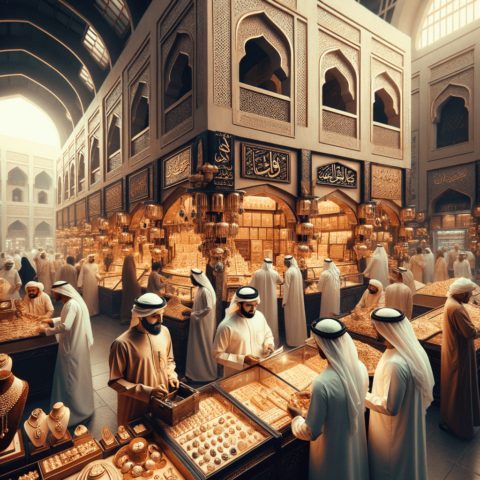
UAE’s Coffee Culture Thrives: Anticipated 8.4% Growth by 2029
August 2, 2024
GGCC Unveils Significant Expansion Plans at Dubai Forex Seminar
August 7, 2024Delve into the thriving gold market of the UAE with the latest rates as of August 7, 2024. This comprehensive guide offers tourists and businesses a glimpse into the dynamic world of gold trading in Dubai, highlighting current prices, market dynamics, and future trajectories.
Current Gold Rates in UAE
As of August 7, 2024, the gold rates in the UAE are as follows: 24K gold at AED 289.75 per gram, 22K gold at AED 268.25 per gram, 21K gold at AED 259.75 per gram, and 18K gold at AED 222.50 per gram. For tourists and businesses, understanding these rates is essential to making informed buying or investment decisions.
For tourists looking to purchase gold jewelry, whether as a souvenir or an investment, Dubai offers a unique advantage with its competitive pricing and high-quality products. Knowing the current rates allows visitors to better gauge the authenticity and value of their purchases, ensuring they get the best deals. This is particularly important in a market as active and diverse as Dubai’s, where options range from small gold souks to massive luxury malls.
Businesses, especially those in the jewelry and investment sectors, closely monitor these rates to optimize their operations. The dynamic nature of gold prices requires constant vigilance, as even slight fluctuations can significantly impact profit margins. For investors, the current lower rates present an opportunity to buy and hold, anticipating potential future gains. For jewelry retailers, understanding these figures helps in pricing strategies and inventory management, ensuring that the offerings are aligned with market expectations and international standards.
Additionally, these rates are reflective of global economic conditions, offering insight into broader market trends. For both tourists and businesses, being aware of the current gold prices not only facilitates better buying and selling decisions but also provides a deeper understanding of Dubai’s vibrant gold market dynamics.
Dubai’s Prominent Position in the Gold Market
As a thriving global gold trading hub, Dubai’s strategic positioning is bolstered by its robust infrastructure, which includes the Dubai Gold and Commodities Exchange and the Dubai Multi Commodities Centre (DMCC). The city’s profound connectivity with primary markets like India, Switzerland, and the USA accentuates its pivotal role in the international gold trade. Dubai’s imports of raw gold for refinement and craftsmanship, along with its re-export of finished products, substantiate its annual $20 billion gold market.
India stands as a significant trade partner, driven by high consumer demand and cultural traditions that elevate gold’s importance. Switzerland, renowned for its precision in gold refining, contributes substantially to Dubai’s gold imports and exports, fostering a symbiotic relationship. The USA’s role as a major gold buyer and seller, driven by both consumer demand and investment strategies, adds another dimension to Dubai’s expansive market.
Dubai’s marketplace thrives not just on external trade but also on an intricate internal network of souks, exhibitions, and state-of-the-art facilities. The renowned Gold Souk in Deira is a prime example, showcasing a wide array of gold jewelry and investment-grade bullion. Evolving consumer preferences and a vibrant economy sustain Dubai’s leading position, making it an attractive destination for tourists, investors, and businesses.
Whether you are a jewelry enthusiast captivated by exquisite craftsmanship or an investor eyeing lucrative opportunities, Dubai’s gold market offers unparalleled potential. This intricate ecosystem, supported by extensive global and local networks, underscores why Dubai continues to be known as the ‘City of Gold.’
Gold Demand and Consumer Behavior
Gold demand in the UAE is intricately linked to cultural practices, economic conditions, and a strong affinity for gold jewelry. In a society where gold is not just a symbol of wealth but also a cultural mainstay, such as during weddings, festivals, and other significant life events, the demand for gold inevitably remains high. The UAE’s substantial expatriate population, hailing from gold-loving nations such as India and Pakistan, further fuels this demand, with many purchasing gold both as a form of investment and a cultural necessity.
In the context of economic conditions, the region’s fluctuating oil prices can have a substantial impact on disposable incomes and, consequently, gold purchases. During periods of economic stability and growth, consumers are more likely to invest in gold jewelry and bullion. Conversely, economic downturns can dampen this enthusiasm, redirecting interest towards essential expenditures.
Moreover, institutional investors and banks play pivotal roles in shaping the gold market in the UAE. Institutional purchases and financial products backed by gold, such as Exchange Traded Funds (ETFs), affect overall market dynamics. During times of economic uncertainty or geopolitical tension, these entities often increase their gold holdings, viewing it as a safe-haven asset. These actions lead to increased demand and higher market prices.
The influences of consumer behavior are multi-layered, involving cultural drives and economic variables, affecting both everyday market conditions and long-term investment strategies. Understanding the nuances of these factors and how they interplay in the gold market can provide crucial insights for tourists and businesses alike when navigating Dubai’s bustling gold economy.
Future Trajectories of Dubai’s Gold Market
Dubai’s gold market’s future is intricately linked to various geopolitical and economic factors. As global uncertainties persist, such as trade tensions, currency volatility, and geopolitical strife, they will likely influence investor sentiment, subsequently impacting gold demand. Additionally, fluctuations in oil prices—a crucial element for the UAE’s economy—play a substantial role. A significant drop in oil prices could decrease purchasing power, altering the market dynamics for both consumers and institutional investors.
Another notable trend is the shift towards digital gold investments. With the advent of blockchain technology and various digital investment platforms, there is a growing preference for electronic forms of gold over physical assets. This transition can democratize gold investments, making it more accessible to a broader audience. However, it also means changes in traditional market drives, such as jewelry purchases, which could see a decline.
This digital shift holds implications for Dubai’s status as a global gold hub. While it could enhance the market’s efficiency and broaden its reach, it may necessitate regulatory adaptations to ensure investor protection and market stability. Furthermore, offering robust digital gold services could attract a new generation of tech-savvy investors, strengthening Dubai’s position in the global gold market.
Understanding these dynamics helps investors and businesses anticipate potential shifts, making informed decisions in an ever-evolving financial landscape.
Understanding Gold Purity Measurements
Gold purity is measured in carats (K), with 24K representing pure gold, characterized by its bright yellow hue. Pure gold, though highly valuable, is too soft for practical uses, necessitating its alloying with other metals to enhance durability and modify color. As you move down the carat scale, the gold content decreases and the presence of other metals like copper, silver, and palladium increases.
**24K gold** is 99.9% pure, often sought for its luster and value, making it ideal for investment rather than everyday wear.
**22K gold** contains around 91.67% gold, mixed with 8.33% metals such as copper and silver. This combination offers a suitable balance between purity and strength, making it popular for high-quality jewelry.
**21K gold**, approximately 87.5% pure, continues to be used widely in Middle Eastern and Asian markets. It offers durability while maintaining a high level of purity.
**18K gold**, composed of 75% gold and 25% other metals, is quite durable and less prone to scratching. This versatility makes it favored by many jewelers for creating detailed, wearable pieces.
**14K gold** contains about 58.33% gold, striking a modest balance between quality and affordability. Its increased resilience and reduced cost make it an attractive option for everyday jewelry wearers.
**9K gold** comprises 37.5% gold, blended heavily with other metals. Although less pure, it’s affordable and robust, ideal for budget-conscious consumers and everyday use.
By understanding these measurements and compositions, tourists and investors in Dubai can make informed decisions when purchasing gold. Each alloy serves a unique purpose, whether for investment, luxury, or practicality, empowering buyers to select items that best meet their needs and preferences.
Conclusions
Dubai continues to shine as a global gold trading hub, offering lucrative opportunities for tourists and businesses alike. With current gold rates and a thorough understanding of market dynamics, investors can navigate the future confidently. The UAE’s robust infrastructure and strategic policies ensure its dominant position in the gold industry, despite economic or geopolitical challenges.





